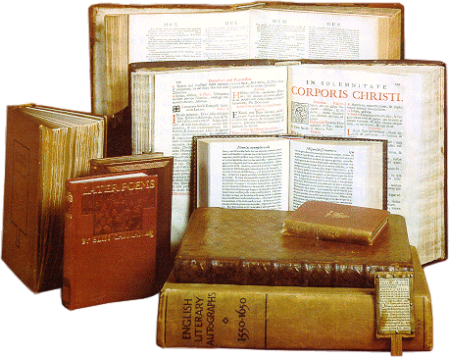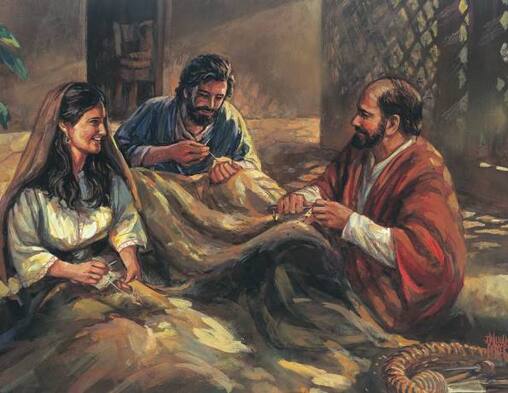Romans 16:1-16
Lesson 312
Read both the "King James Bible" and the "New Living Translation."
In this lesson:
The epilogue continues from lesson 311.
Paul's personal greetings (16:3-16).
The epilogue continues from lesson 311.
Paul's personal greetings (16:3-16).
Tentmakers Priscilla, Aquila, and Paul.
By an unknown artist.
By an unknown artist.
Who was -
Phebe -
Phebe, meaning bright or radiant, was a deaconess in the church of Cenchrea (in southern Greece). Her parents may have named her after the pagan goddess, Phoebe. Many Bible scholars believe Phebe delivered this letter (Romans) to Rome for Paul.
Priscilla and Aquila -
Aquila and Priscilla (also called Prisca) were a married missionary couple (Acts 18:2) who befriended Paul. All three supported the ministry by tent-making (Acts 18:3). Aquila and Priscilla helped Paul spread the Gospel and risked their lives for him, for which he repeatedly thanked them (Romans 16:3-4). Aquila was from Pontus (Acts 18:2), a client kingdom of the Roman Empire near the Black Sea. But he lived in Rome until he and Priscilla were driven from their home due to their Christian beliefs. They fled to Corinth, where they met Paul and helped him establish a church. Later, they traveled with Paul to Syria (Acts 18:18) and then to Ephesus on the second missionary journey. In Ephesus, they did missionary work and turned their home into a church (1 Corinthians 16:19). They were eventually allowed to return to Rome, where they once again held church services in their home (Romans 16:5). Some years later, they returned to Ephesus (2 Timothy 4:19).
Epaenetus -
Epaenetus was the first Christian in Achaia. Although from Achaia, Epaenetus was now in Rome. He was either related to Stephanas or worked in his home. Stephanas and his household were baptized by Paul (1 Corinthians 1:16).
Andronicus and Junia -
Two brethren who became Christians even before Paul (Romans 16:7). Some Bible scholars believe they converted from Judaism, but can't prove this. They were imprisoned with Paul due to their faith. Where and when they were jailed, Paul does not say. In this passage, they are probably elderly. Per the theologian Hippolytus (AD 170-235), Andronicus became the bishop of the Roman province of Pannonia. However, the Christian monk Abba Dorotheus wrote that he was the bishop of Spain.
Urbane -
Urbane was probably a slave, as this was a common Roman slave name. We see in this verse that he helped spread Christianity.
Apelles -
Another friend of Paul's. Appelles was one of the seventy disciples sent out by Jesus to prepare people for the Messiah's visit (Luke 10:1-3). After the crucifixion, Apelles became the bishop of either Smyrna or Heraceia.
Aristobulus -
The son of Herod the Great and the father of King Herod Agrippa 1. Christian tradition states that Aristobulus became a bishop in Britain and died there.
Tryphena, Tryphose, and Persis -
Three feminine names. Tryphena and Tryphose were possibly deaconesses in the church in Rome. Nine of the twenty-seven people named by Paul in lessons 312 and 313 are women.
Rufus -
The son of Simon the Cyrenian who helped Jesus carry the cross to Golgotha and crucifixion (Mark 15:21). Rufus' mother was also a Christian and took special care of Paul.
Phlegon -
Another of the seventy disciples sent ahead by Jesus to prepare people for His visit. Some scholars believe Phlegon later became the bishop of Marathon in Thrace.
Hermas -
Another friend of Paul's who lived in Rome. He was declared a saint by the Catholic church.
Hermes -
It is believed that Hermes was another of the seventy disciples sent out by Jesus. In later life, he became the Bishop of Dalmatia (in modern-day Croatia).
Philologus and Julia -
Two more slave names. Per the theologian Hippolytus, Philologus was another of the seventy disciples and became the bishop of Sinope, a city on the Black Sea in modern-day Turkey.
Nereus -
Some scholars believe that Nereus was beheaded in Terracina (Italy), cremated, and his ashes placed in the church.
Phebe -
Phebe, meaning bright or radiant, was a deaconess in the church of Cenchrea (in southern Greece). Her parents may have named her after the pagan goddess, Phoebe. Many Bible scholars believe Phebe delivered this letter (Romans) to Rome for Paul.
Priscilla and Aquila -
Aquila and Priscilla (also called Prisca) were a married missionary couple (Acts 18:2) who befriended Paul. All three supported the ministry by tent-making (Acts 18:3). Aquila and Priscilla helped Paul spread the Gospel and risked their lives for him, for which he repeatedly thanked them (Romans 16:3-4). Aquila was from Pontus (Acts 18:2), a client kingdom of the Roman Empire near the Black Sea. But he lived in Rome until he and Priscilla were driven from their home due to their Christian beliefs. They fled to Corinth, where they met Paul and helped him establish a church. Later, they traveled with Paul to Syria (Acts 18:18) and then to Ephesus on the second missionary journey. In Ephesus, they did missionary work and turned their home into a church (1 Corinthians 16:19). They were eventually allowed to return to Rome, where they once again held church services in their home (Romans 16:5). Some years later, they returned to Ephesus (2 Timothy 4:19).
Epaenetus -
Epaenetus was the first Christian in Achaia. Although from Achaia, Epaenetus was now in Rome. He was either related to Stephanas or worked in his home. Stephanas and his household were baptized by Paul (1 Corinthians 1:16).
Andronicus and Junia -
Two brethren who became Christians even before Paul (Romans 16:7). Some Bible scholars believe they converted from Judaism, but can't prove this. They were imprisoned with Paul due to their faith. Where and when they were jailed, Paul does not say. In this passage, they are probably elderly. Per the theologian Hippolytus (AD 170-235), Andronicus became the bishop of the Roman province of Pannonia. However, the Christian monk Abba Dorotheus wrote that he was the bishop of Spain.
Urbane -
Urbane was probably a slave, as this was a common Roman slave name. We see in this verse that he helped spread Christianity.
Apelles -
Another friend of Paul's. Appelles was one of the seventy disciples sent out by Jesus to prepare people for the Messiah's visit (Luke 10:1-3). After the crucifixion, Apelles became the bishop of either Smyrna or Heraceia.
Aristobulus -
The son of Herod the Great and the father of King Herod Agrippa 1. Christian tradition states that Aristobulus became a bishop in Britain and died there.
Tryphena, Tryphose, and Persis -
Three feminine names. Tryphena and Tryphose were possibly deaconesses in the church in Rome. Nine of the twenty-seven people named by Paul in lessons 312 and 313 are women.
Rufus -
The son of Simon the Cyrenian who helped Jesus carry the cross to Golgotha and crucifixion (Mark 15:21). Rufus' mother was also a Christian and took special care of Paul.
Phlegon -
Another of the seventy disciples sent ahead by Jesus to prepare people for His visit. Some scholars believe Phlegon later became the bishop of Marathon in Thrace.
Hermas -
Another friend of Paul's who lived in Rome. He was declared a saint by the Catholic church.
Hermes -
It is believed that Hermes was another of the seventy disciples sent out by Jesus. In later life, he became the Bishop of Dalmatia (in modern-day Croatia).
Philologus and Julia -
Two more slave names. Per the theologian Hippolytus, Philologus was another of the seventy disciples and became the bishop of Sinope, a city on the Black Sea in modern-day Turkey.
Nereus -
Some scholars believe that Nereus was beheaded in Terracina (Italy), cremated, and his ashes placed in the church.
Study Tip:
Read both the Old and New Testaments.
"Nothing less than a whole Bible can make a whole Christian."
Aiden Wilson Tozer (1897-1963).
Read both the Old and New Testaments.
"Nothing less than a whole Bible can make a whole Christian."
Aiden Wilson Tozer (1897-1963).




